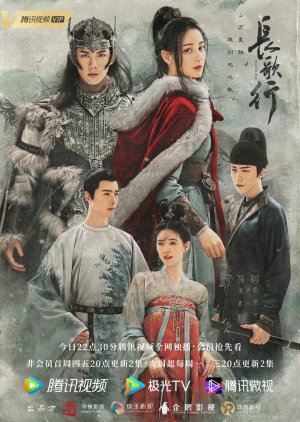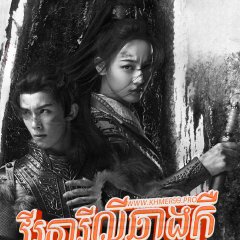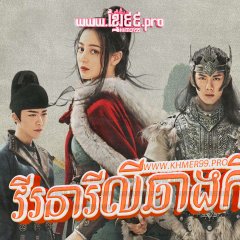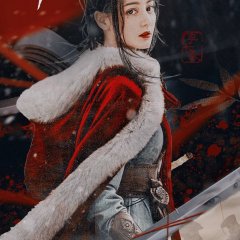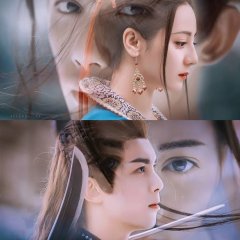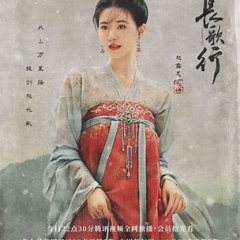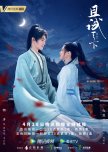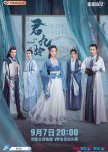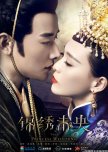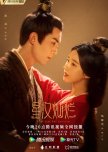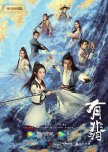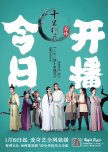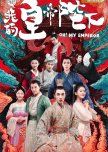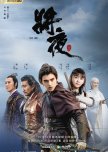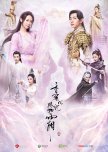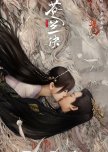 Ultra Fan Guide to Zhao Lu Si
Ultra Fan Guide to Zhao Lu Si O ano é 626 E.C, e o reino, com seu centro político em Changan, teve suas estruturas abaladas pelo incidente no Portão de Xuanwu, um golpe palacial bem-sucedido em assumir o poder da Dinastia Tang. Um príncipe ardiloso lidera o golpe violento e mata a família de Li Chang Ge durante o ataque, apesar de ela conseguir escapar. Agora, o príncipe assumiu para si o trono Imperial e governa como o Imperador Tai Zong. Li Chang Ge tem sua mente firmemente concentrada na vingança e reúne um exército poderoso e disposto a derrubar o novo Imperador. No entanto, seus planos são postos em xeque quando ela sofre uma derrota inesperada contra os exércitos do Grão-Canato Turco Oriental. O general vitorioso, Ashi Na Sun, decide mantê-la em seu serviço, nomeando-a sua estrategista militar enquanto ele mesmo procura cumprir suas próprias metas militares. A dupla forma uma parceria militar formidável e, no decorrer do tempo, ela percebe estar se apaixonando por seu captor, assim como ele também começa a sentir algo a mais por ela. Mas o que será da missão de Li Chang Ge por vingança, caso ela continue servindo ao lado do General? (Fonte: Viki) Editar Tradução
- Português (Portugal)
- 한국어
- 中文(简体)
- Burmese
- Título original: 长歌行
- Também conhecido como: Chang Ge Xing , Princesa Changge
- Roteirista: Chang Jiang, Pei Yu Fei, Ji Sang Rou
- Diretor: Chu Yui Bun, Gu Zhi Wei
- Gêneros: Ação, Histórico, Romance, Guerra
Onde assistir The Long Ballad
Elenco e Créditos
- Dilraba Dilmurat Papel Principal
- Leo Wu Papel Principal
- Liu Yu Ning Papel Principal
- Zhao Lu Si Papel Principal
- Alen Fang Papel Principal
- Yi Da Qian Papel Secundário
Resenhas

The Ballad of Li Chang Ge
The drama tells the story of Li Chang Ge (Chang Ge is transliterated as “Long Song”, hence the title of this drama), a princess of the great Tang who after inadvertently getting embroiled in the vicious court politics of the royal family, ends up on a journey of self discovery during her self-imposed exile. Along the way, she discovers the true meaning of friendship, love, justice and sacrifice for the greater good.When I first heard about this production and read the synopsis some time early last year, and based on the cast involved, I fully expected it to be a romance-driven “light” historical featuring popular young idols. I then came across the trailer towards the end of 2020, which totally changed my perception - the drama looked every bit the dramatic and potentially epic production it was rumoured and publicized to be, while the outstanding OST songs by powerhouse performers sensationalized it even further. Since then my expectations were exponentially raised and I had been patiently waiting for it to air. Having completed it months later, I’m happy to declare - my expectations are utterly fulfilled!
Production
The Long Ballad is adapted from the China Animation Golden Monkey Award and Golden Dragon Award-winning manhua Chang Ke Xing by renowned writer Xia Da. It is directed by prolific HK director Chu Yui Bun who has notably helmed dramas such as Singing All Along, Noble Aspirations I and II, Ashes of Love and Skate into Love. Due to legal proceedings over intellectual property issues between the writer and the publishing company, this historical fantasy manhua remains incomplete, thus paving the way for the award-winning screenwriter Chang Jiang to develop the screenplay and, in particular, the ending to the story. She has a formidable portfolio of works comprising The Advisors Alliance, Growling Tiger, Hidden Dragon, Secret of Three Kingdoms and Novoland: Eagle Flag. As a result, what we get is a very well produced and executed historical drama.
Technical Aspects
The drama features extraordinarily innovative visual presentations. In particular, the transitioning of ALL battle scenes from live action to manhua and donghua formats. Although not everyone is pleased with this and would prefer to see real action, I actually found it to be quite refreshing and artistically delivered. Additionally the usage of “monochrome against colour” juxtaposition to re-create memory flashbacks in certain scenes is creatively rendered.
Cinematography for the most part is quite exceptional, where overhead photography of the cityscape of Chang’an is featured, and some immersive camerawork for certain scenes particularly at Liuyun Abbey, and the cherry blossom valley in the grasslands. The indoor cinematography and the effective use of lighting ensures that the scenes depicted are never dim or dull. The use of soft filters and vibrant colour palettes provides a generally pleasant and vivid viewing experience.
The CGI effects are sparingly applied, although principal photography took place in Hengdian. While certain blips are exposed, on the whole it has been adequately presented. The horse-jumping at the bridge scene isn’t the most realistic, for instance.
Because this drama isn’t a full fledged wuxia, the fight choreography depicted is more grounded and practical. That said, there are demonstrations of “martial prowess” by the likes of the Taoist priestess Madame Jing Dan and the roving swordsman Situ Lang Lang in one of the more breathtaking moments of action. On the other hand, I can’t really comment on the action scenes on the battlefields, since they were not depicted as live-action. But generally there’s more than enough fight scenes to make up for the lack of massive sieges and battles.
Story and Characters
Despite being historical fiction, certain events and characters depicted are based on actual historical records of 7th century Tang Dynasty. The Xuanwu Gate incident, Emperor Taizong, the war between Tang and the Ashina clan of the Eastern Turkic Khaganate, among other depictions. The elements of both fiction and reality are seamlessly interwoven and thrillingly executed over the course of the entire 49 episodes. The drama has a very lively start and the pacing of the storytelling has largely been brisk and engaging. Multiple locations are showcased which sustains the momentum of the plot and provides viewers with a variety of scenery to savour. From the Tang Dynasty’s imperial city of Chang’an to the frontier city of Shouzhuo, the preceding Sui Dynasty’s ancient capital of Luoyang, the grasslands of Mongolia and the Northern Desert of Mobei.
There’s no question that the quality of the storyline is very good, which is attributed to the excellence of the source material and screenplay. However, as much as this drama is plot driven, it is also made that much more compelling by the depth of its central as well as supporting characters. I quite like the way most of the characters have been written. Apart from having sufficient character development, in particular Li Chang Ge, Li Le Yan and Hao Du, the interactions and chemistry between everyone in general are realistically and convincingly portrayed. This applies across the board to all the political factions as well as those without affiliations. I also think that the portrayal of women in this drama is deserving of praise. The major female characters are multidimensional and each of their respective story arcs is very satisfyingly fleshed out.
Cast and Acting
This is the fourth time I’ve watched Dilraba Dilmurat, having seen her in Swords of Legends, Liu Shan Men and The Flame’s Daughter. She delivers a commanding performance here and I think she has improved markedly since the last time I’ve seen her. Her portrayal of the FL made me even more invested in her character and thus her journey of redemption. The same feeling applies to Zhao Lu Si, whom I last saw in Dating in the Kitchen. This young lady is very versatile indeed and it is especially gratifying to see her infuse the character of Li Le Yan with so much believability and relatability.
As far as Wu Lei is concerned, many people seem to still view him as that baby-faced teenage bodyguard in Nirvana in Fire who has never really grown up to adulthood. Since NiF, I’ve seen his gradual development in productions such as The Imperial Doctress, and Fights Break Sphere. He has indeed matured into a fine young man with well defined chiselled features and his casting for the role of Ashile Sun is on point, where he gives a fine overall performance. My second time seeing Liu Yu Ning since Ultimate Note, he seems to excel in very similar roles - the stone-faced and distant sort of characters. However, his portrayal as the misunderstood and rather pitiful Hao Du is nothing short of commendable. It took a while but I eventually warmed up to his characterization. I saw a bit of Alen Fang in Jiu Liu Overlord (which I didn’t complete) previously and I think appearance-wise he does suit the character of Wei Shu Yu the way it was meant to be portrayed.
It’s worth mentioning the notable performances of the supporting cast in the form of veterans Geng Le, Cheng Tai Shen, Lu Xing Yu, and Yang Ming Na in the roles of Li Shi Min (Emperor Taizong), Advisor Du Ru Hui, Governor Gongsun Heng and Princess Yi Cheng respectively. Special guest stars who deserve acknowledgment are Sa Ding Ding, (the renowned singer who also contributes a track for the OST), Liu Hai Kuan (of The Untamed fame) and Richards Wang (In a Class of Her Own), for their memorable appearances as Taoist Priestess Madame Jing Dan, swordsman Situ Lang Lang, and King of Mobei Yaoluoge Pusa respectively.
Soundtrack
As usual, my habit of compiling the track listing for posterity. This drama has some of the most unforgettable songs ever composed and performed for a historical production. Featuring powerhouse singers Zhou Shen, Sa Ding Ding, Zhang Bichen and Jin Wen Qi. In addition, the lovely second couple contributes a song each.
Cocoon 繭 by Zhou Shen 周深
The Direction of Light 光的方向 by Zhang Bichen 张碧晨
If Return 如若归来 by Sa Dingding 萨顶顶
Falling Sand 落砂 by Jin Wen Qi 金玟岐
I Wish You Were My Long Lasting 多麼願你是我恆久的歌 by Zhao Lu Si 趙露思
A Love Like Before 一愛如故 by Liu Yu Ning 刘宇宁
Overall
Well made, well executed, well acted. The Long Ballad is a drama well done. If you’re a C-historical fan, do yourself a favour and get this on your watchlist asap. If you’re not a regular watcher of this genre but are intrigued by the premise, this drama would represent the perfect starting point in watching your first historical C-drama. As an added bonus, don’t worry about the curse of the C-historical for this one. Rest assured, you may enjoy it with a peace of mind.

A Perfect Blend of Adventure, Friendship and Romance
The Long Ballad, adapted from a popular ongoing manga, Chang Ge Xing, by Xia Da (夏达), won over me with its inspirational characters and life lessons, strong friendships and bonds, and unique storyline. Not only did it provide me with an amazing drama watching experience, but also made me sympathize and feel for many of the characters. In case you didn’t know, the Long Ballad’s title comes from Li Changge’s name. Li is her surname, while Changge means ‘Long Ballad’. (or long song)I have to admit that I set my expectations quite high for this drama, as it has a star-studded cast, a cast filled with actors and actresses that I have watched in other dramas before, and impressed me with their acting skills. Adding on to my excitement was the director, Chu Yui Bun, who had directed 3 dramas that I exceptionally loved. But even with my bar set high, this historical Chinese drama won me over.
Something especially unique with the Long Ballad is that it provides some connections and reminders to the manhua. Quite a few war scenes and other scenes are in a cartoon-ish form. The actors may be in the scenes, but the backdrops are green screens. The transitions were a little abrupt, but I really enjoyed these scenes and they were very beautiful. I also really loved the costumes. They were absolutely gorgeous, and fit the different settings and period very well.
Story-9.0
As I started the drama, I was introduced to a bustling Chang An, the capital of the highly successful Tang Dynasty, which lasted from 618 to 907 AD. Many historians consider the Tang Dynasty a 'Golden Age', specifically of arts and culture. During this period, people from all around the world came to China for education, traveling, business, and many other reasons. During the reign of Li Shimin, also known as Tang Taizong, civilians lived in peace and happiness, and without poverty. It truly was a beautiful time. The drama also motivated me, who already had some knowledge of the Tang Dynasty and Tang Taizong's achievements, to research more about this era. My research also resulted in the knowledge that quite a few people in the Long Ballad are real people that lived during the Tang Dynasty, including Ashina Sun's cousin, Ashina She'er, Wei Shuyu and his father, Wei Zheng, a well-known Tang Chinese politician and historian, and the crown prince of the drama, Li Chengqian.
The beginning of the Long Ballad is not set during the most famous prosperous period, though. It is actually set right before Li Shimin's successful reign. Li Changge is a Tang Dynasty princess, the daughter of the crown prince, having everything and even more that a girl during that time or even now could have. But her entire family is killed by her Second Uncle, Li Shimin, and her life is turned upside down. At first, I was worried that the drama would be centered around a normal revenge plot, but thankfully, I was very wrong. Revenge might have been something that Li Changge focused on, but this is not the main topic/theme of the drama. The Long Ballad also explores strong friendship, cute romance, loyalty, family, and so much more.
The drama is by no means centered around politics or war. Politics is almost nonexistent in this drama, which is a relief for many, although power played an important role in the Long Ballad. We are shown that power was very important for one's success in ancient times, and this can also apply to us during modern times.
The main goal of the drama is not for the characters to gain some mystical object, but rather to show their immense character growth, and the growths are shown very realistically. I was not only entertained, but was also given different perspectives of life and the many relationships in our lives. The plot was not very predictable, and the plot twists made the drama experience even more memorable.
Fortunately, the actors and actresses also did very well with the fighting scenes. We are provided with well thought-out and practiced fighting scenes that look very polished and natural. Bravo!
There were a few loopholes, though. I won’t elaborate too much on this, but there were a few spots in the drama where I felt that the characters could have done something differently for a better result. Otherwise, I wouldn’t change anything else about the drama. The plot is very propelling, and unlike some other historical Cdramas, is not very slow-paced.
Cast-9.5
The cast is one of the reasons I decided to watch the Long Ballad. What better to watch my two favorite Chinese actresses in one drama, along with the handsome and mature Wu Lei? And Liu Yuning is a plus!
I had absolutely no problems with the 7-year age gap between Dilraba and Wu Lei. In fact, they looked so compatible together that my smiles and fawning were almost always uncontrollable. It is more than evident how much Ashina Sun and Li Changge care for each other, from their actions to even just their facial expressions. The Long Ballad is not centered around romance, but it does have a good amount of it. We are given a few couples, each with their own cute scenes.
Leo Wu, at age 21, just awed me again. For those who have watched Nirvana in Fire, he is nothing like that cute and innocent Fei Liu. I mean, Ashina Sun is also handsome (amazingly handsome) and cute, but in a much more mature way. His aura spreads everywhere. Ashina Sun is a man of righteousness and kindness. Although he seems cold and perhaps a little emotionless, viewers start to see his real personality as he interacts more with the ones he cares about, including Changge. Not only does he have a great personality, but his fighting skills are also one of the best, with him being able to hit a certain point with his bow and arrow long distances away.
Li Changge is not an easy character to play. Her determined personality becomes even more prominent after the deaths of her family, as she becomes even more determined to avenge for their deaths. No, she is not that naive and bubbly little princess. She is a strong-willed, talented, and intelligent young woman who, as she leaves the place she had called home for her entire life, discovers the real world and the things that lay ahead for her. Again, Dilraba impresses me with her portrayal of this awesome Tang Dynasty princess.
Now we come to Li Leyan, played by our lovely Zhao Lusi, and she is the daughter of Li Shimin and the cousin of Li Changge. I admit, I was hoping for a "stronger" Li Leyan in the beginning, as her personality was quite naive and perhaps a little too generous and kind, but she, like Changge, entered the real world, where there were no servants to wait on her and no jewels and crowns for her to wear. Li Leyan's growth is phenomenal and inspirational. In the end, I absolutely adored her character. She, unlike a few other characters in the Long Ballad, is not completely useless. Li Leyan's kindness spread throughout the nation, from donating food to saving civilians from natural disasters. She is almost the perfect princess, with a little more intelligence and thoughtfulness sprinkled in.
Hao Du is another favorite character in Long Ballad. Liu Yuning acts him out very well, being quite disliked by Leyan at first, he shows her that he does not have a heart made of stone. In fact, he cares for his friends and family very much. Unlike Wei Shuyu, he was not born into a very wealthy family, although he was adopted by his godfather. He was taught at a very young age to work hard for the Tang Dynasty, to even sacrifice his life for it. Along with many other characters, Hao Du’s personality slowly grew on me.
Some other characters, although minor, were also essential in this story. A few good examples include Mu Jin, Ashina She’er and Mimi Guli. There were many other characters that I both loved and hated. At first, the main antagonist was not very clear, but as the story progressed, everything was revealed, providing me the very person to despise and wish for the worst. The antagonist, which I will not say, does have a considerably good reason to do what they did, and they were a major obstacle for the protagonists of the Long Ballad to pass. Sacrifices were made, along with alliances and friends and enemies. There were many characters in the Long Ballad, and it was a little hard to remember everyone's names at first, which is the norm for Chinese historical dramas. But most characters had their own special purposes, and everyone acted very realistically and well.
Music-9.5
Amazing osts. Period. When I watched the first episode, and first heard the opening and ending songs, I already fell in love with two Long Ballad osts. If you are an avid Cdrama watcher, you probably recognize the voices, or even the names, of these singers: Zhang Bichen, Zhou Shen, Sa Dingding, Liu Yuning. They have sung osts for countless dramas, and are very well-known in China. The soundtrack for the Long Ballad is very enjoyable and unique, with wonderful melodies, voices, and lyrics. It’s very hard for a drama to have one or two good songs, let alone five or six.
Rewatch Value-8.5
The Long Ballad is a very good drama to rewatch, for both the plot and character development. I’m not high on rewatching, so my rewatch values are often pretty low for most dramas that I have watched. But this drama certainly has many scenes to rewatch and to re-enjoy. I'm also happy to say that I was more than satisfied with the ending, as it gave me an amazing closure for many characters.
Overall-9.5
The Long Ballad has creeped up to my top 10 Chinese dramas, and probably my top 5 Chinese historical dramas. As a big fan of historicals, I thoroughly enjoyed the story. It provided me with an amazing sense of what Tang Dynasty life is, and the goals and perspectives of people living different lives. It would seem impossible that a Tang Dynasty Princess would meet and fall in love with a Turkish prince, but it happened, and made many of us fall in love with the couple. I highly recommend the Long Ballad for Chinese drama watchers, especially ones that like to watch historical adventure and romance dramas.

